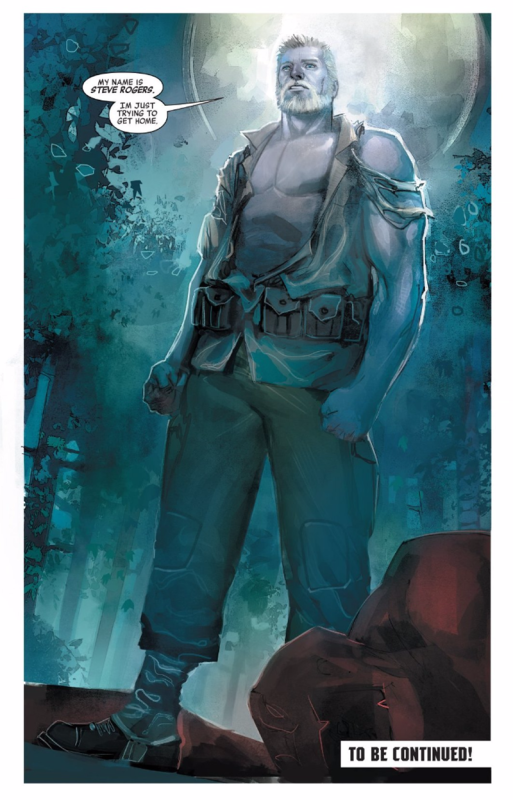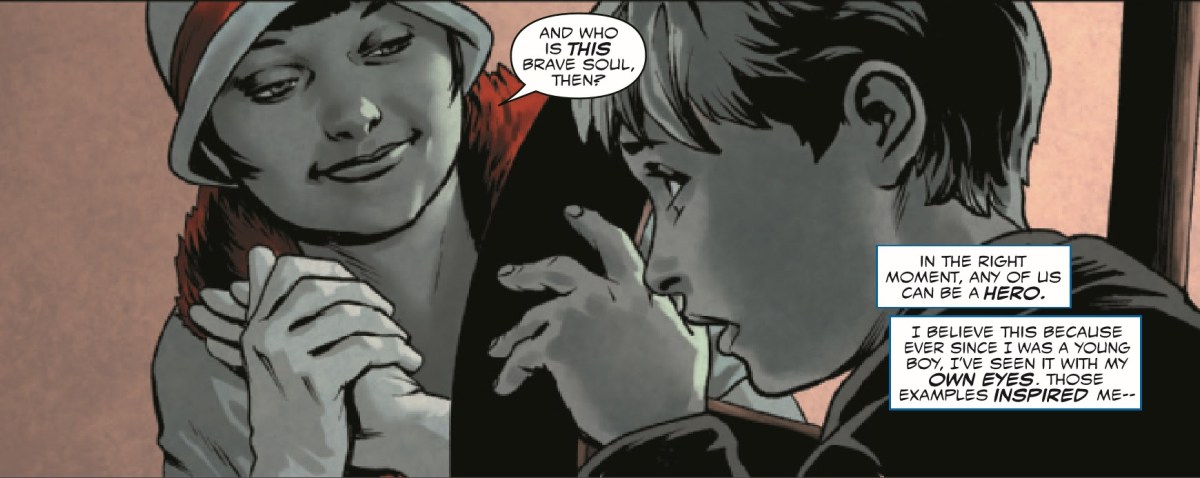When I’m not Mary Sue-ing, I’m a writer of fiction. I love making up stories and sharing them with people. And when I talk about pop culture here, I tend to come at it from a place that gives writers the benefit of the doubt and asks readers to be patient, and let a story unfurl past one chapter, or episode, or issue before letting the complaints fly, so that you don’t miss out on someone’s unique way of telling a story. But creators have responsibilities, too.
**SPOILERS FOR SECRET EMPIRE #2 AHOY!**
According to io9, we got a big reveal in Captain America‘s recent Steve Rogers Has Always Been a Nazi Hydra Agent storyline in this week’s Secret Empire #2. The issue ends with the following full-page image. Ready?

OK, so what? HydraCap isn’t the real Steve Rogers? Or this one isn’t? Or they’re both real and this one’s from some kinda alternate timeline? According to Nerdist, “this man calling himself Steve Rogers is a good guy who saves an innocent woman from the Serpent Society.”
‘K.
For every complaint there has been about this storyline, there have been those saying things like Don’t worry! This is how comics always are! They do crazy stuff, then change it again. It’ll all be fine.
As if many, if not most of the people doing the complaining weren’t regular readers of comics. As if this were, as Nerdist put it, “exactly the sort of thing that gets picked up by broader news outlets out-of-context,” implying that real comics journalists couldn’t possibly get that upset about it. Not if they really knew anything about comics.
*sigh*
We read plenty of comics around here at The Mary Sue. We know that retcons to continuities happen, that mantles change hands and that heroes change depending on who’s writing them. We’re no stranger to the idea of shaking up the status quo only to hit the reset button and pretend it never happened. That’s not the point.
The point is, one’s desire to tell a certain story shouldn’t necessarily trump the needs and wishes of the people to whom they hope to tell that story. I’m not saying that every story needs to be vetted by the general public before being told. Not at all. However, there are certain things that creators need to keep in mind before committing to tell certain stories.
Hydra, no matter what Marvel says or tries to change, will always be associated with Nazis. You don’t get to have Captain America Punching Hitler remain an iconic image that you’re proud of, but erase the fact that the organization you had helping Hitler in those stories was Hydra. You don’t get to pick and choose which parts of your history fans remember. Thanks to the Internet, they can remember it all.
And so, when you want to do anything with Hydra, you have to substitute in the word “Nazis.” You have to ask yourself How is this going to be received? And if you’re any kind of a human being, you will hopefully at least consider the fact that perhaps you needing to tell this story isn’t more important than the hurt you’ll cause a swath of your readership by taking a cherished hero and making them a Nazi. Even if it’s just for a story arc. Even if it’s going to be retconned later. Sometimes the big reveal and the ol’ switcheroo isn’t worth it.
And if it is … what does that say? What have you proven? What does it profit you to “get” to tell that story if it loses you people’s faith and trust. Like, congratulations, you got to tell the story you wanted. Next time, people won’t care about hearing your story as much. They’ll seek their stories elsewhere, because you no longer speak to, or speak for them.
The thing is, no one is even saying to get rid of Hydra! It’s not about never having stories that involve them. It’s not even saying don’t ever have a story where someone who is conflicted joins Hydra. There are plenty of ways to tell fascinating stories using Hydra that speak to the human condition and could help us better understand and process the world around us. But there’s no reason to take a character in whom many find hope and strength and tarnish them in this way. Too much salt in the wound, people. Wasn’t killing him enough?
This might sound overblown to a lot of people. But stories aren’t “just stories” and comics aren’t “just comics.” Stories are how human beings process and interact with the world around them, and comics are our modern-day mythology. Our pop culture stories are the building blocks through which we create our world. It matters what they say. It matters what writers write. It matters what creators put out into the universe. Twist endings are great and all, and sometimes they can even be fun, but not when it means causing real people real pain.
Like another Marvel character once said, “With great power, comes great responsibility.” Comics creators and publishers have great power in that they have a mass-produced platform at their disposal that can get into the hearts and minds of thousands if not millions of people at a time. They have a responsibility to use that power wisely.
(images: Marvel Comics)
Want more stories like this? Become a subscriber and support the site!
—The Mary Sue has a strict comment policy that forbids, but is not limited to, personal insults toward anyone, hate speech, and trolling.—









Published: May 18, 2017 04:26 pm